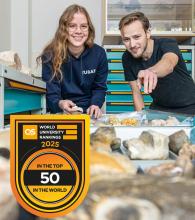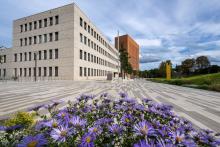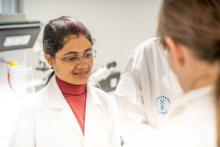The university in rankings
The TU Bergakademie Freiberg is one of the leading technical universities in Germany and also enjoys an excellent international reputation.
The university is regularly rated very highly in national and international university rankings in the areas that define its profile. Current rankings such as QS, CHE and CWUR confirm our research strength, international orientation and excellent study conditions for students.
Image

TUBAF
Studies and students
Study programmes
- 68 Bachelor's, Master's and Diploma degree programmes, including
- Teaching-optimised degree programmes in STEM subjects: Applied Computer Science, Applied Natural Science
- Orientation study programme WIN
- Mobility study programme with Master's multiple degree
Total students
4,389 academic year 2024/2025 (as at 1.05.2025), of which:
- in STEM subjects: 83%
- female students: 33%
- international students: 52%
Students by subject group
- Engineering: 47.8%
- Mathematics, natural sciences: 26.5%
- Economics: 25.8%
Image

TUBAF
International students
Students from all continents: India, Iran, Pakistan, China, Bangladesh, Morocco, Ghana, Mongolia, Mozambique, Ukraine
German scholarships
- 75 German scholarships awarded in 2024
Research, transfer, start-ups
Early career researchers
- Promotions 2023/24: 66 completed doctorates
Research
- Total third-party funding 2024: 63.9 million euros
Transfer activities
- Invention reports 2024: 19
- Patent applications 2023: 32
Foundations
- 33 start-up projects
- 6 spin-offs
Internationality
International partnerships
- 184 active partnerships, including
- 76 ERASMUS agreements and 18 interdisciplinary university collaborations
- 255 contacts on six continents with other universities in 50 countries
Liaison offices abroad
- Uzbekistan: Tashkent (opening 2023)
- Mongolia: Ulaanbaatar (opening 2024)
Study programmes
- Multiple degree programmes
- Double degree agreements with partner universities in China, France, Ghana, Italy, Poland, Russia (suspended), Thailand, Czech Republic, Hungary, Ukraine
Personnel and structure
Employees
2,126 employees on 1 June 2025, of which:
- 1.038 budget employees
- 762 externally funded employees
- 326 student and research assistants
- 90 professors
- 6 junior professors
- 16 trainees
Structure
- 6 faculties
- 13 central institutions
- 42 institutes
- 11 departments
- 11 institutes of higher education
- 11 research institutes
- 11 research institutes
- 11 research institutes
- 11 researchInstitutes
- 7 Centres of Excellence
Image

TUBAF

